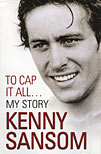 My Story
My Story
by Kenny Sansom
John Blake, £17.99
Reviewed by David Stubbs
From WSC 258 August 2008
Kenny Sansom’s autobiography ought to be a rollicking, tasty read. He was brought up alone in south London by a strong-willed mother, his father having departed family life to work with the Krays. A joker, he appears more proud at times of his Norman Wisdom impersonation than a career in which he won 86 England caps. He also liked a drink – he was a key member not just of Arsenal’s mid-Eighties defence but also their wrecking crew, embarking on many a bibulous adventure with Tony Adams, Paul Merson and so on, fuelled by pints of Chablis and whisky. He played in two World Cups, including the “Hand of God” game against Argentina in 1986, ascribing the defeat as much to Steve Hodge’s forgetfulness when it came to offside traps as to Diego Maradona. He comes across as a likeable, reflective, self-effacing fellow, whose laddishness doesn’t tip over into outright lairiness or TalkSport gobbishness.
The trouble with To Cap It All is, simply, in its telling. Anecdotes, unpromisingly commencing along the lines of “there was another very amusing incident which occurred around this time” peter out, such as the one in which he and some team-mates mocked mobile-phone touting yuppies by picking up bananas and speaking into them.
Cliches patch the narrative together like ugly grey bits of duct tape. There are far too many sentences such as the following: “I wanted to be part of the setup at Arsenal. It was straight out of a Roy Of The Rovers comic, where a young hopeful’s dreams are realised.” The book is written in a sort of Pooteresque tabloidese, stilted and, for all its inanity, not at all resembling the way any normal person would express themselves.
Sansom travelled the world during his career and here are his vivid impressions. On China: “Let me tell you (you probably know anyway) it’s one hell of a big nation.” On dining at the top of the Vancouver Hotel: “You should have seen the view. It was absolutely magnificent.” The sheer monotony of the prose becomes unbearable, like a dripping tap or a grown man shouting “Mr Grimsdale!” every few seconds on a team coach.
Yet, To Cap It All is redeemed by Sansom’s relating of his recent struggles with lifelong alcoholism and his experiences at Adams’s Sporting Chance rehab centre. His reflections aren’t earth-shattering, but the fact that his efforts to conquer his addictions, as well as the ending of his 37-year relationship, are so recent lends the account a warmth and freshness. You genuinely feel for the guy and respect his honesty in acknowledging his battle against himself isn’t over. You even forgive the rather awkward feel of the previous couple of hundred pages – it’s as if this is the stuff he really wanted to say, and that’s reflected in the sudden, marked improvement in the writing, if only for a chapter or so.